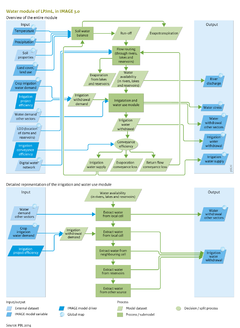Water/Description: Difference between revisions
< Water
Jump to navigation
Jump to search
m (Text replace - "Livestock systems" to "Livestock") |
m (Text replace - "Crop and grassland model" to "Crop and grass") |
||
| Line 2: | Line 2: | ||
|Status=On hold | |Status=On hold | ||
|Reference=Biemans, 2012; Rost et al., 2008; Gerten et al., 2004; Biemans et al., 2011; Nilsson et al., 2005; Alcamo et al., 2003; Davies et al., 2013; Pastor et al., 2013; | |Reference=Biemans, 2012; Rost et al., 2008; Gerten et al., 2004; Biemans et al., 2011; Nilsson et al., 2005; Alcamo et al., 2003; Davies et al., 2013; Pastor et al., 2013; | ||
|Description=The [[LPJml model|LPJmL model]] simulates the global carbon and water balances as part of the dynamics of natural vegetation and agricultural production systems. Because of the coupling of LPJmL to IMAGE, the carbon cycle, natural vegetation, crop production ([[C cycle and natural vegetation dynamics]] and [[Crop and | |Description=The [[LPJml model|LPJmL model]] simulates the global carbon and water balances as part of the dynamics of natural vegetation and agricultural production systems. Because of the coupling of LPJmL to IMAGE, the carbon cycle, natural vegetation, crop production ([[C cycle and natural vegetation dynamics]] and [[Crop and grass]]), land-use allocation ([[Forest management]]) and hydrology can be modelled in a consistent way. | ||
==The ‘natural’ hydrological cycle== | ==The ‘natural’ hydrological cycle== | ||
Revision as of 16:21, 11 December 2013
Parts of Water/Description
| Component is implemented in: |
|
| Related IMAGE components |
| Projects/Applications |
| Key publications |
| References |
